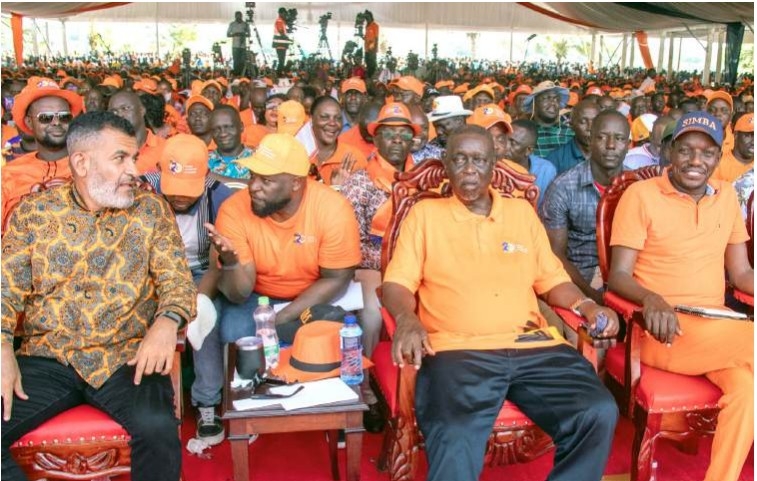The newly enacted law on electoral reforms is tipped to herald a new dawn in managing the 2027 general elections.
From reducing the term of the Chief Executive officer from five years to four to enhancing the experience of commissioners to 10 years, the new law spells fresh ways of doing things.
This would mean that the CEO, who is also the commission secretary will oversee only one election cycle unlike in the current scenario where they manage two polls.
The radical amendments to the Independent IEBC Act have overhauled the IEBC commissioners' selection process and radically altered the commission's administration.
On Tuesday, the country’s key political figures attended the IEBC Amendment Bill signing ceremony, 2024 at an open forum at KICC, pacifying the country reeling from deadly protests.
President William Ruto told the country that he is ready to work with all leaders on a “broad-based political mechanism that will steer the country to the future".
“Kenya knows how to pull together, leaders know how to come together in the best interests, not of individuals or parties, but of the collective body of the Kenyan people," Ruto said after signing the bill into law.
Critically, the new law seeks to address fundamental issues that had posed bottlenecks in the administration and management of the country’s elections.
Hiring of IEBC Commissioners
One of the key issues addressed in the new law is the procedure for the recruitment of the IEBC commissioners.
The law has been amended to have highly qualified commissioners who are also well-versed in information technology, the senators said.
IEBC currently does not have commissioners, which has in turn held it back from performing key mandates such as by-elections and the long-awaited boundaries review process.
Voters in Banissa constituency in Mandera and two wards in Western Kenya have gone for months without an MP and MCA respectively, after the positions fell vacant.
Operations at the IEBC have adversely been affected following the retirement of Chairman Wafula Chebukati and Commissioners Boya Molu and Abdi Guliye in January 2023.
Three other commissioners namely Juliana Cherera (vice-chairperson), Francis Wanderi, and Justus Nyang’aya resigned while Irene Masit was kicked out of office by a tribunal.
Under the current law approved on Tuesday, there will be a selection panel of nine people who will recruit the next crop of IEBC commissioners.
The current selection panel of seven stood dissolved by dint of the presidential assent to the IEBC amendment bill on Tuesday.
The proposed law says the current team will cease to exist when the Bill is enacted, although the members could be re-nominated.
“The selection panel existing immediately at the commencement date of this Act ceases to exist but a person who served as a member of that selection panel may be nominated to serve as a member of a selection panel appointed under this Act,” it reads.
The membership of the new IEBC selection panel will be selected by various players.
The panel will consist of two persons nominated by the Parliamentary Service Commission, representing the majority/minority parties or coalitions of parties.
Only parties with more than 17 members in Parliament may nominate a representative to the selection panel.
“A parliamentary party means a party or coalition of parties consisting of not less than five per cent of the membership of the National Assembly and the Senate,” the new Act reads in part.
The panel will also consist of three persons nominated by the Political Parties Liaison Committee.
Of the three, one will be from a party other than a parliamentary party or coalition of parties, another from a parliamentary party or coalition of parties forming the national government.
The third PPLC nominee will be drawn from a parliamentary party or coalition of parties not forming the national government.
The Law Society of Kenya will second one person to the team while the Institute of Certified Public Accountants of Kenya has one slot.
Two persons will be nominated by the Inter-Religious Council of Kenya.
The slot assigned to the Public Service Commission was removed in the new law.
Curing Chebukati-Cherera fiasco
A notable structural change is the elimination of provisions allowing the vice-chairperson or any member to act as chairperson in the event of a vacancy.
This move is intended to consolidate leadership and maintain clear lines of responsibility within the Commission.
The new law seeks to delete section 7A of the IEBC Act which grants the vice chairperson and members a chance to act when there is no substantive chairperson.
The old law that was reviewed provided that whenever a vacancy occurs in the office of the chairperson, the vice chairperson shall act as the chairperson.
It said that the person taking over shall exercise the powers and responsibilities of the chairperson until a new chairperson is appointed.
Ahead of the declaration of the 2022 presidential elections, a section of commissioners disowned the IEBC results saying there was no consensus on the winner of the presidential poll.
Known as the Cherera Four, they moved to Serena Hotel moments before Chebukati declared President Ruto as the winner and denounced the Bomas of Kenya results.
"We are rejecting the results the Chairman is about to announce at the Bomas of Kenya due to the opaqueness of the process during the final phase," they stated.
The Supreme Court ruled that they did not provide any evidence of results tampering, saying they participated in the tallying and verification exercise from the beginning until just before the declaration of the results by the Chairperson.
Chebukati accused the four commissioners of attempting to usurp his role as chairman and declare parallel results.
In 2018, the courts made a finding that it was unconstitutional for the chairperson or any other commissioner to exercise the chairperson’s powers on reasons of absence.
The decision in the case by Katiba Institute was that the provision allowed someone not qualified under the constitution to take the office of chairperson.
The judges held that the provision weakened IEBC and affected its institutional independence owing to the powers granted to commissioners.













![[PHOTOS] Three dead, 15 injured in Mombasa Rd crash](/_next/image?url=https%3A%2F%2Fcdn.radioafrica.digital%2Fimage%2F2025%2F11%2Fa5ff4cf9-c4a2-4fd2-b64c-6cabbbf63010.jpeg&w=3840&q=100)

